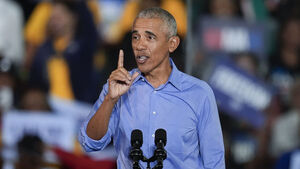Fallon's Town Talk: ERSI’s ominous words and Obama low-key spark mixed memories

Former US president Barack Obama made a low-key visit to Ireland where he received the Freedom of Dublin (AP Photo/Mike Stewart)
The budget is looming and a sense of unease about the state of the economy is growing. It’s not just the usual prophets of doom who are expressing concern about the budget: august bodies such as the Central Bank and the Economic and Social Research Institute are warning of the danger of the government overheating the economy with its planned €9.4 billion spending increase.
Of course, none of the economists in these institutions is taking into account how the cost of living crisis is affecting people who have, for example, seen the price of their weekly shop soar over the last 18 months. Add in the hikes in energy prices before the onset of winter and it’s clear why many people will need financial help in the budget.
It means that the Minister for Finance, Paschal Donohoe, is facing a delicate balancing act. Donohoe was quick to react to the ESRI report by emphasising that he and the Minister for Social Expenditure, Jack Chambers, are aware of the warnings and were determined not to add any risk to the economy.
It was Donohoe in his customary reassuring, unflappable mode. However, he has to know that his Prudent Paschal persona is under scrutiny in a way it hasn’t been before.
While the ESRI forecast wasn’t all gloomy – it revised upwards its forecast for growth for this year to 3.9% for the domestic economy – one line stood out. On the vexed topic of windfall taxes paid by multinationals, the ESRI warned that these taxes which have buttressed the economy and allowed giveaway budgets in recent years could vanish quickly.
Then came the kicker: “Parallels to the collapse in building-related taxes at the outset of the economic crisis of 2007-2008 are clear.” The very mention of the economic crash was enough to cause even the most sanguine person to gulp. The sense of foreboding in the ESRI’s words was seized upon by the Opposition in the Dáil.
All of us who lived through The Crash will dread the prospect of a return to those dark days when the troika of the Eurogroup, the European Central Bank and the dreaded International Monetery Fund (IMF) tool control the country’s finances from 2010 to 2013.
Neither Fianna Fáil or Fine Gael will want to preside over anything remotely similar.
The ESRI’s ominous words weren’t the only throwback to 2008 last week as former US president Barack Obama made a low-key visit to Ireland where he received the Freedom of Dublin. It was a reminder of how Obama was catapulted into office in 2008 because of promises of hope and change just as economic turmoil threatened to engulf the world. The timing of the award, nine years after he left the White House, was curious, even more so as the ceremony took place in private.
It was such a contrast to the euphoria which greeted Obama’s state visit to Ireland in 2011. The country was in the grip of the economic crisis at the time and the visit of the charismatic, urbane, glamorous duo of Obama and his wife Michelle lifted spirits.
His mantra of hope struck a chord with the cheering throngs, while translating his famous catchphrase ‘Yes We Can’ into Irish didn’t come across as contrived or cheesy. We needed all the help we could get from the US at that time and nobody minded the then-Taoiseach Enda Kenny piling on the flattery. It’s a reminder that leaders of other countries buttering up US presidents didn’t start with Donald Trump.
The reputations of all major political figures wax and wane but, just now, Obama’s once-sparkling lustre has dimmed. Whether anybody outside the US likes it or not, Trump is emerging as one of the most consequential US presidents in a long time.
He is reshaping the US and the world in a way that is the antithesis of everything Obama stood for. Trump nonchalantly takes swipes at Obama and he is, so far anyway, too aloof to hit back or to become the inspiration for any concerted opposition to Trump’s policies.
It’s also clear that the bizarre awarding of the Nobel Peace Prize to Obama when he had barely begun his term in office is one of the major motivating factors in Trump’s blatant canvassing for the same accolade.
Obama is, arguably, the finest public orator of the 21st century thus far, but, inevitably, his soaring words weren’t always matched by his deeds. Politics has changed irrevocably since Obama electrified the world in 2008. For the moment, he seems a symbol of a bygone age that isn’t returning any time soon.





